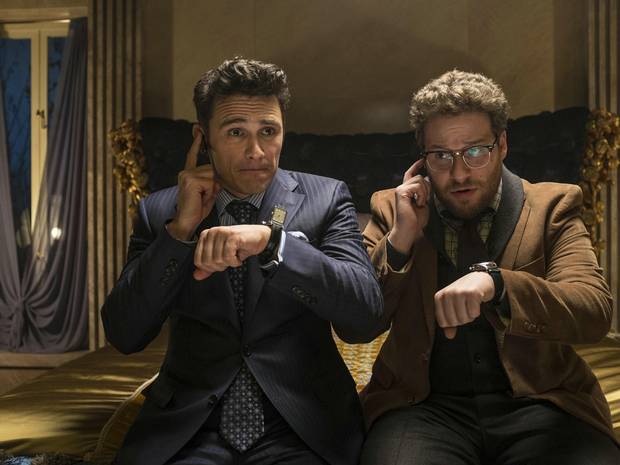The nation finds itself divided once again, but not over marriage equality, or the recently-released CIA report that details the less-than-pleasant methods they used to coerce information out of detainees. No, America now finds itself split over the pressing issue of a Seth Rogen movie.
For those who aren't up to speed, here’s the Reader’s Digest version of the story so far: Seth Rogen and James Franco starred in The Interview, headed by Sony Pictures, in which the duo, as news personalities, are drafted by the CIA in an effort to assassinate North Korean dictator Kim Jong Un. But what was intended to be a wacky screwball comedy caught the ire of someone, as threats started coming from North Korea, claiming it to be an act of war. About a month ago, words turned into action as Sony found itself a victim of a massive hacking, exposing many current and former employee’s private details, medical records, celebrity contracts, and more than a few embarrassing emails. The hackers, alleged to be North Korean according to the latest developments, continued to release information until The Interview was canceled. When no signs of Sony backing down showed, movie theaters who planned on showing the film received threats of violence. One by one, theater chains turned down the comedy, until Sony threw its hands in the air and canceled the movie release.
Reaction was strongly split, and though predictably the split was divided among political party lines, there was much more purple overlap than the usual red/blue bickering. Some found the cancellation to be the most responsible move; with the possibility of a egotistical dictator with heavy artillery and nuclear weaponry at his fingertips, putting lives in jeopardy for a movie was a risk not worth taking. Others lambasted the decision, crying that we have lost the war on terrorism, or at least a battle, succumbing to the wishes of a group of cybercriminals, and losing our American dignity.
One point that became clear immediately and agreed upon by both sides though, to paraphrase a Seinfeld episode, is that the cancellation is not going to be good for business. Every form of entertainment media, including gaming, needs to pay particular attention to the continued fallout of this move because, to paraphrase that same Seinfeld episode, this is not going to be good for anybody.

Gaming already finds itself under the constant slings and arrows of particular groups who target “offensive” material in gaming, gaining some traction even as groups in Australia have pressured Target and K-Mart department stores to stop sales of Grand Theft Auto V. Likewise, the Russian government, those huggable mooks (if you like hugging rocks), have banned The Sims 4 as pro-LGBTQ propaganda, since two Sims of the same gender can have relationships and partnerships and pixilated woohoo. It’s not far off to say that retailers are already behind the proverbial 8-ball on this issue. Now let’s say a war game comes along, say, an iteration of Call of Duty comes along, and it takes place in a real-life hostile territory. On top of religious groups and government oppression, should retailers now have to worry about attacks on their or their patrons’ well-being? The concept sounds absurd, but so does having to rethink the way we see entertainment because of a silly bro-comedy.
Not just retailers face retaliation, though, for we are all cyberbeings as well as physical people in the 21st century, and if we game, it’s nigh-impossible to avoid an online service such as PlayStation Network, Xbox Live, or the Nintendo Network. And on these networks we keep vital information. Identification, such as emails or gamertags can be linked to other, more crucial information, and don’t forget, all that DLC and digitally-distributed games had to come from someone’s credit card, right? A world of financial ruin awaits our data, which we take for granted is encrypted; should a “questionable” game fall under the crosshairs of an extremist group, that very data attached to each one of us stands in jeopardy.
Surely measures can be taken to improve the defenses of these two threats. Stepping up security detail in and around retailers would certainly help, with key note given to prominent, well-shopped retailers, where the most turmoil could come from an attack. Focusing on applying the newest techniques and technologies in cybersecurity wouldn’t hurt either, and not being afraid on spending the cash to do so up at the network level. Many theorize that Sony would not have been breached had the head honchos paid attention to the potential security lapses and spent the money to fix or secure them. Many also theorize that maybe not making movies revolving around the assassination of a somewhat-crazy nuclear bomb-toting dictator would have prevented this outcome, so there’s that.
And yet, snark aside, the right for games to feature plots that push the boundaries and challenge our minds is the exact intangible most in danger right now, in all forms of entertainment – film, TV, music, literature, and yes, even gaming, especially gaming. Film and TV often play it relatively safe; projects considered a “challenge” revolve around retconning Bruce Wayne’s childhood, or presenting seasons based on different plots with the exact same groups of actors, or filming a modern movie in black and white. Music can challenge people, but rarely will those songs find mainstream acceptance.

Video games, though, are still an adolescent medium – not in terms of the age of those who play, but in the life cycle of the medium itself. Games have evolved from what those in the ‘80s and ‘90s popularized to the 21st century’s epic quests that rival the cinema itself, that tackle heavy topics and morality choices. Games are tools of education and enlightenment as much as entertainment, and in order to do that, sometimes stories will have to be told that are offensive to some and disturbing to others. With the effort to shut down The Interview successful, could Germans launch an effort to cancel further Wolfenstein games? Can games surrounding religious cults, whether real or fictional yet akin to real religions, be taken down? If so, the world may have never played BioShock 2 or the game regarding the Cult of Patriotism, BioShock Infinite.
It is a precipice gaming toes frequently, one that now grows even smaller and more dangerous. The 2009 tactical shooter-turned-vaporware Six Days in Fallujah made waves due to its (allegedly) harrowing realism in recreating the Second Battle of Fallujah for entertainment purposes, prompting backlash from military groups and resulting in Konami refusing to publish the game. The backlash, though, was from our nation's allies, not foreign terrorists with the capacity to harm; with games being a perpetual scapegoat, the Interview fallout adds not only a layer of concern in the development process, but more fuel to the fire of those who would use it for their personal or professional gains via the “blame game.”
Despite gaming's growing sense of self-awareness when it comes to content, the self-policing of the Entertainment Software Review Board, which generally – not always – does satisfactory work in ensuring games with potentially-questionable content are labeled for consumer information, and the efforts made to legitimize the medium as a worthy associate next to television, film, and literature in terms of storytelling, the gaming industry has not been hit with the kind of force that brought Sony to its knees. For an industry that arguably has existed only since the early 1980s, such an attack could cripple all of its advancements not in technology, but in creativity.

Fortunately for the gamersphere, the history of gaming shows that pushing the boundaries ranks as one of the greatest strengths of our medium. Games that recently include Telltale's The Walking Dead, Ubisoft's Valiant Hearts: The Great War, and the indie hits from The Fullbright Company, Gone Home, and 11-bit Studios, This War of Mine, not only are enjoyable but challenge the gamer's notions and morality along the way. Gaming stands as the young upstart amongst major mass media, and in a sense is the rebel of the bunch. Eventually we will find ourselves in a situation where a great game has developed that cheeses someone off, and we'll find ourselves there time and again, because we care about great stories. And what we learn from this whole Interview fallout can be the difference between standing up and prevailing or finding ourselves a crippled medium.
Sony now holds several cards to play, ranging from dropping the issue altogether to stomping on the metaphoric gas pedal and ramming full speed ahead, and we, as gamers, should be especially vested in their response – not for a show of uber-patriotic machismo, but to protect the rights of the creative mind. If stories deserve to be told, they need the freedom to do so. One can only hope that like a good RPG, this defeat, combined with a little grinding behind the scenes, can lead to victory the next time this battle occurs.











